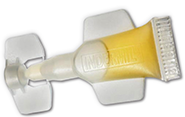Biomedical Engineering Students Excel in Case Study Competition

On Friday, November 2, the Yale Healthcare and Life Sciences Club hosted their annual Case Competition with Yale Engineering's own "Team-SEAS" placing second out of twenty participating groups. The competition was designed to inspire the collaboration of students from multiple disciplines, and this year's case study, "The Future of Hernia Fixation," was no exception. Teams were tasked with assessing the viability of adhesives in ventral and inguinal hernia procedures. Each group needed to predict the U.S. market for these adhesives and then develop a financial plan that the medical equipment and supply company Covidien could successfully implement.
Fittingly named after the School of Engineering & Applied Science, Team-SEAS described their group as being particularly well suited for a case like this. Team-SEAS included members who had experience in research, product development, and the FDA regulatory process. In addition, members of the team were well versed in the medical device business. Biomedical Engineering graduate students Parid Sava, Kevin Rocco, Linda Fong, Andres Munoz, Jonas Schwan as well as Executive MBA student Wendy Davis, all came together amidst Hurricane Sandy to propel Team-SEAS into second place in the competition. This is even more impressive considering Team-SEAS finished ahead of stiff competition from MBA students, surgeons, and competitors from the consulting industry.
Team-SEAS felt that their strategy and tactical approach to the case gave them a distinct advantage over other competitors. The team credited part of their success to knowledge shared as biomedical engineers and that their familiarity of human anatomy and biomaterials proved vital for this competition. Team-SEAS approached the case based on the medical need for a new adhesive for hernia procedures. With that clear focus on the problem, the group was able to construct a solid financial model to determine whether or not Covidien should pursue or invest in the product.
In their case summary, Team-SEAS evaluated the possibility of cyanoacrylate glues, a product Covidien currently manufactures for topical use, gaining FDA approval for use in hernia fixation. By using data-driven analysis, Team-SEAS was able to forecast the U.S. market for adhesives and predict the total market that Covidien could own up to the year 2029. When accounting for the investment that the company would have to make in order to get past the FDA regulatory process, Team-SEAS concluded that the adhesives market would not be lucrative in the next five years and that the product would not break even until 2027. Taking into account the small size of the adhesive market for hernia repair compared to the total soft-tissue adhesive repair market, Team-SEAS also recommended that Covidien should avoid investing in adhesives for hernia repair unless the company wanted to explore a larger market.
For compiling a presentation that was thorough, provided justified analyses, and displayed superior rationale, Team-SEAS was awarded a second place prize of $1,000. Reflecting upon the experience, the team relayed that overall the case competition was enjoyable and a great learning experience. With their strong placement, Team-SEAS showcased the versatility of a biomedical engineering degree and provided one more example of the ever growing culture of engineering at Yale.

